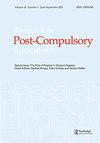经济、社会和文化资本在理解英语继续教育专业性中的重要性:布迪厄式的方法
IF 0.9
Q3 EDUCATION & EDUCATIONAL RESEARCH
引用次数: 0
摘要
本文运用布迪厄的资本理论来考察英语继续教育部门工作人员的专业态度差异。尽管有证据表明位置性会影响专业性的体验方式,但在这一领域进行的实证工作很少。布迪厄区分了三种形式的资本,它们可以决定一个行动者的社会地位,以及由此产生的态度和实践:经济资本、文化资本和社会资本。通过开发每个资本的措施,探索感知专业的差异。一项针对461名员工的调查显示,每个首都都对专业精神有净影响。在这三个资本中,文化资本的影响最大,反映了员工对专业知识和职业发展的重视程度。本文证实了利用布迪厄来探索塑造专业态度的因素的价值,并包括对部门领导者和政策制定者的实际意义。本文章由计算机程序翻译,如有差异,请以英文原文为准。
The importance of economic, social and cultural capital in understanding professionalism in English Further Education: a Bourdieusian approach
ABSTRACT In this article, Bourdieu’s theory of capital is used to examine differences in the professional attitudes of staff who work in the English Further Education (FE) sector. Little empirical work has been conducted in this field despite evidence that positionality can influence how professionalism is experienced. Bourdieu distinguishes three forms of capital that can determine an actor’s social position and the attitudes and practices that flow from this: economic, cultural and social capital. By developing measures of each capital, differences in perceived professionalism are explored. A survey of 461 staff responses revealed that each capital has a net effect on professionalism. Of the three capitals, cultural capital has the largest effect, reflecting the importance staff assign to expertise and professional development. The article confirms the value of using Bourdieu to explore the factors that shape professional attitudes and includes practical implications for sector leaders and policymakers.
求助全文
通过发布文献求助,成功后即可免费获取论文全文。
去求助
来源期刊

Research in Post-Compulsory Education
EDUCATION & EDUCATIONAL RESEARCH-
CiteScore
1.30
自引率
14.30%
发文量
31
期刊介绍:
Throughout the world, there is a growing awareness of the significance of vocational and post-compulsory education and training systems. The majority of countries are working hard to develop their provision, recognising the importance of post-compulsory education in providing educated and skilled people in sufficient numbers at appropriate levels to assist economic and social development. Research in Post-Compulsory Education, sponsored by the United Kingdom"s Further Education Research Association (FERA), recognises the need for more international research and analysis and the generation of relevant theory in order to identify policy needs and trends as well as priorities in this growing area.
 求助内容:
求助内容: 应助结果提醒方式:
应助结果提醒方式:


